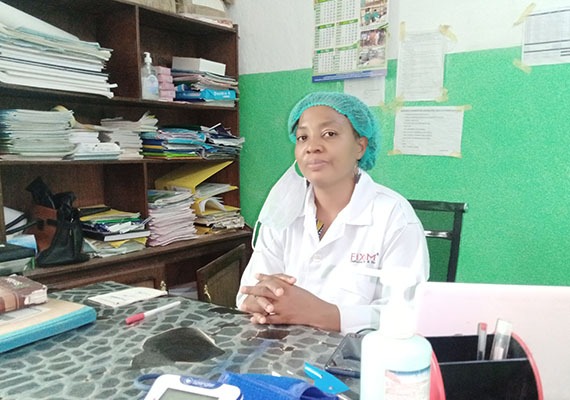Menstruation: An exposure to HIV/AIDS AND STD’s

Madame Hio-Hiol Hortense working as the focal point PMTCT and major for PMI at the Catholic hospital in Douala talks to us about HIV/AIDS, STDs and menstruation.
Human Immunodeficiency virus infection and acquired immunodeficiency syndrome (HIV/AIDS) is a spectrum of conditions caused by infection with the human immunodeficiency Virus (HIV), a retrovirus. Following the initial infection, a person may not notice any symptoms or may experience a brief period of influenza like illness. Typically, this is followed by a prolonged period with no symptoms. If the infection progresses, it interferes more with the immune system, increasing the risk of developing common infections such as Tuberculosis. These late symptoms are referred to as acquired immunodeficiency syndrome (AIDS). HIV is spread primarily by unprotected sex, contaminated blood transfusions, hypodermic needles and from mother to child during pregnancy, delivery or breastfeeding.
Are menses carriers of HIV/AIDS?
Madame Hortense says during menstruation, the two hormones meant to optimize the conditions for fertilization and pregnancy estradiol and progesterone directly affects the epithelial cells, fibroblasts and immune cells that line the female reproductive tissues. In doing so, the immune system is dampened and the risk of HIV acquisition is significantly increased. This therefore means that, menses are carry HIV/AIDS and the risk of transmission during menstrual flow is high.
Are youths more at risk to have STD’s during menstrual flow?
There is another factor boosting your risk of STD’s during menstrual flow. On a non-period day, your vagina naturally has a protective acidic PH, which helps to prevent the passage of certain STI’s says Madame Hortense. But when you are menstruating, the vagina becomes less acidic and more alkaline. That makes it easier for microbes to survive and thrive in your reproductive tract. Almost every STI poses a slightly larger threat when you have your period. Bacterial infections such as chlamydia and gonorrhea can be especially dangerous. Period blood is the perfect petri dish for spreading disease says Madame Hortense. Blood borne sexually transmitted infections like HIV and Hepatitis love the nutrients that periods offer.
Is it a good idea to have sex during menstrual flow?
The general culture of sex during menstrual flow is that it is nasty. This is due to the fact that blood spills everywhere on both partners during the act. Sex during menses has a lot of health benefits as it reliefs you from cramps, makes your period become shorter, your libido changes thanks to hormonal fluctuations.
How many times is it recommended to change sanitary pad during menstrual flow?
Change your pad as often as you need to feel comfortable and clean says Madame Hortense. Remember it is best to select the right absorbency for your flow so you can wear the pad comfortably for several hours. Check your pad at regular intervals (2-4 hours) to see if there are any leaks. As you become comfortable with your period and body, you will develop a better sense of how often you need to change your pad.
Written by Che Engochan with the expertise of Madame Hio-Hiol Hortense










